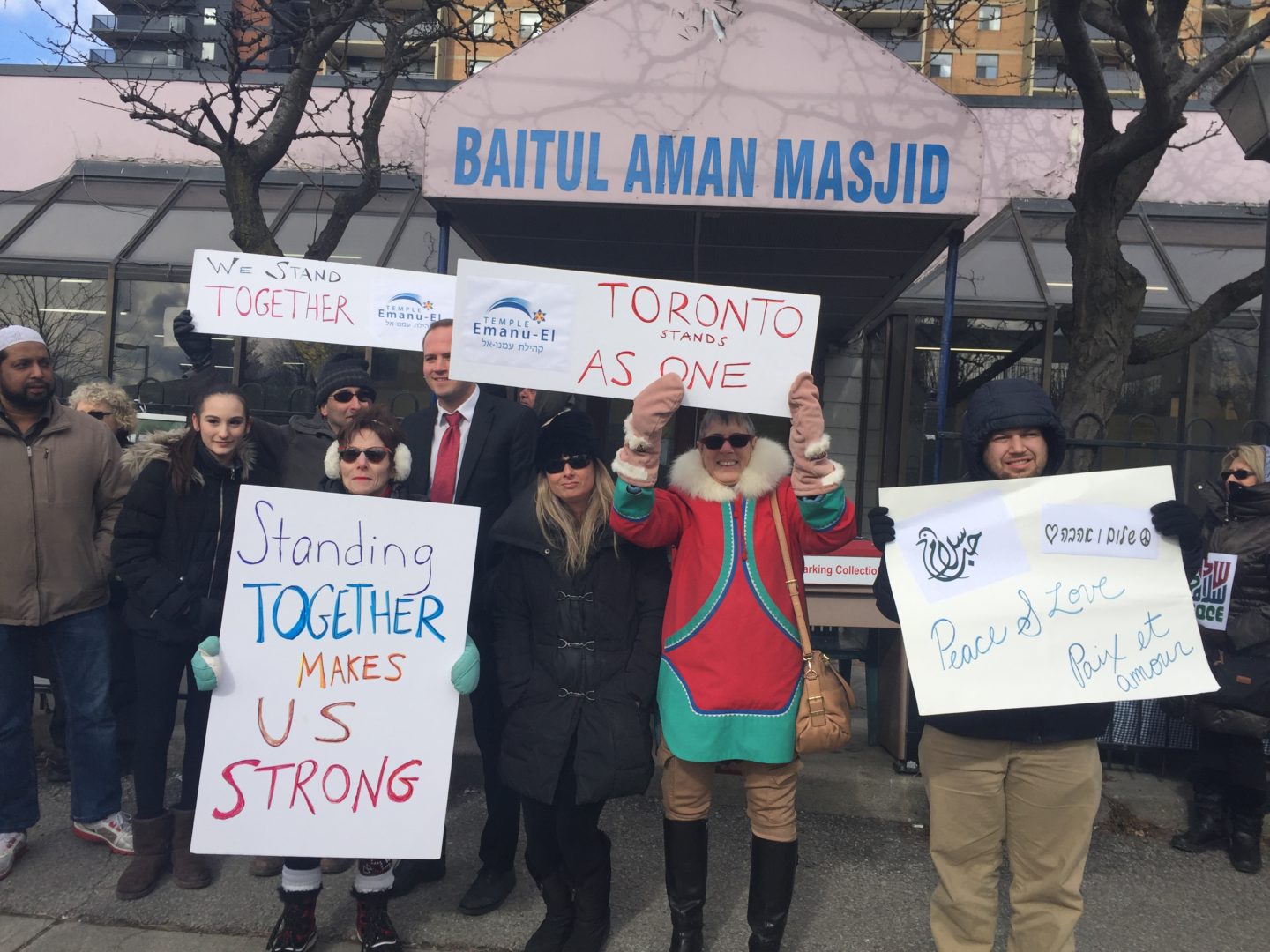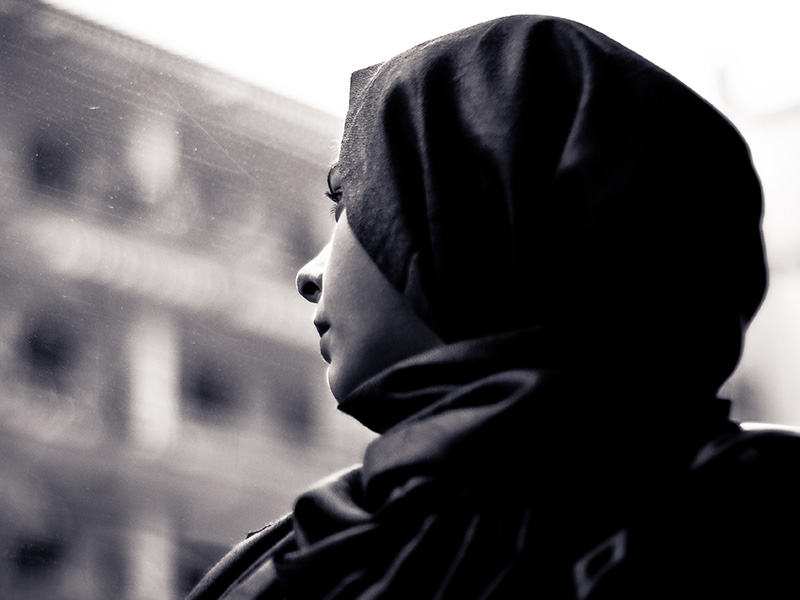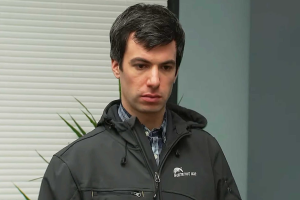The two definitions are jarring in their difference.
Anti-Semitism, according to Merriam-Webster Dictionary, is “hostility toward or discrimination against Jews as a religious, ethnic, or racial group.”
Islamophobia, meanwhile, is defined as an “irrational fear of, aversion to, or discrimination against Islam or people who practice Islam.”
Fear and aversion. Few Muslims in Canada would disagree that they face these on a daily basis.
Islamophobia took its deadliest turn in Canadian history on Jan. 29 when 27-year-old Alexandre Bissonnette allegedly opened fire in a Quebec City mosque, killing six worshippers and injuring 19 more, six critically.
READ: HUNDREDS OF JEWS FORM ‘RINGS OF PEACE’ AT TORONTO MOSQUES
Muslim leaders noted that the shootings, coupled with U.S. President Donald Trump’s 90-day ban on immigrants from seven Muslim-majority countries, should lay to rest any doubts that Islamophobia is real.
Muslims needed little reminder.
Hate by numbers
The number of police-reported hate crimes against them more than doubled over a three-year period (2012 to 2014), according to figures released by Statistics Canada last year.
In 2013, an Angus Reid poll revealed that 54 per cent of Canadians held unfavourable views of Muslims – up from 46 per cent in 2009. In Quebec, a negative view of Islam was held by 69 per cent of the population.
Also in Quebec, polls have shown there is still strong support for aspects of the previous Parti Québécois government’s so-called “Charter of Values,” which sought to limit religious symbols and clothing worn by public employees.
Anti-Islamic sentiment was also stoked in some quarters by Canada’s admission of some 25,000 refugees from Syria between November 2015 and March 2016.
‘The word beclouds the moral issue. If you have a moral problem with somebody, then you assume they’re rational and that they made a bad choice, as opposed to phobia’
Jewish institutions and organizations roundly condemned the Quebec City shootings, expressed condolences and reached out to Muslims. In the Toronto area, members of nine Reform and Conservative synagogues formed “rings of peace” around local mosques on Feb. 3. In Montreal and suburbs, Jewish displays of solidarity took place at three mosques. Jews attended some 20 nationwide vigils.
READ: B.C. SCHOOL RESCINDS BAN AGAINST ISRAELI STUDENTS
What’s in a name?
The rampage in Quebec City raised the general question of how Jews, as a people who have experienced history’s most brutal forms of prejudice and hatred, should respond to Islamophobia?
First, there’s the word itself.
Prof. David Novak, a University of Toronto expert on Jewish theology, ethics and philosophy (and an ordained Orthodox rabbi) bluntly calls Islamophobia “a soundbite” and “a stupid phrase.”
“It comes out of the question of homophobia,” Novak told The CJN, and implies “that people who have moral objections to homosexuality are therefore somehow mentally ill [or] phobic. This whole phobia business is a kind of pseudo-psychological explanation for problems.”
The word “beclouds the moral issue,” Novak argued. “If you have a moral problem with somebody, then you assume they’re rational and that they made a bad choice, as opposed to phobia, where you basically demonize the opposition and say, ‘well obviously if you don’t think like I do, then there’s something mentally wrong with you.’
“I strongly object to the use of the term.”
He would prefer the term “anti-Islamic,” comparable to “anti-Judaic.” However, comparing Islamophobia with anti-Semitism “is a little bit different, because anti-Semitism and anti-Judaism are not the same things.”
Prof. Morton Weinfeld, a sociologist at Montreal’s McGill University, said the term Islamophobia has merit.
“It combines fear of Muslims with dislike of Muslims. It makes a certain amount of sense. ‘Anti-Islamicism’ is clumsier.”
Asked whether Jews are speaking out more now against Islamophobia, Weinfeld said, “it depends which Jews.”
Liberal Jews are more comfortable publicly opposing Islamophobia – and it was mostly liberal synagogues that sponsored Syrian refugees – while more traditional Jews “have been much more ambivalent because they are keenly aware of the fact that a lot of Muslims are opposed to Israel.”
A Jewish duty to speak out?
There is a Jewish duty to speak out against Islamophobia, said Barbara Landau, co-founder of the Toronto-based Canadian Association of Jews and Muslims.
“Our teachings from rabbis Hillel and Akiva make caring about our neighbour a fundamental principle of Jewish ethics,” Landau said. “As a group, Jews have been vulnerable to irrational hatred for centuries, and therefore, our experience enhances our empathy and responsibility to speak out when others experience racism and faith-based prejudice.”
Karen Mock, chair of the progressive Zionist group JSpace Canada and a longtime anti-racism activist, agreed Jews are duty-bound “to speak out against all forms of prejudice, bigotry and hate.”
Mock said that, “sadly,” she has encountered Jews “who easily recognized anti-Semitism and discrimination against themselves, but fail to be able to accept and name discrimination against others.”
When she points that out, “most well-meaning people begin to clarify that it was a specific act or series of acts that they oppose.”

While Jews indeed have “a moral obligation” to oppose all forms of discrimination, “the real question” is how one defines Islamophobia, said Novak.
Killing worshippers in a mosque certainly qualifies as hatred of Muslims. So does believing that Islam is an evil religion, he said.
“On the other hand, if someone says that we have a particular problem with Islamicist terrorism, I don’t consider that to be Islamophobia.”
Terrorism, theology, tradition
Novak said he feels Islamophobia is clouded by “the problem of what has been called Islamicist terrorism, which certainly cannot be blamed on Islam, but certainly a lot of Islamic theology seems to lend itself to that.”
While the Jewish tradition on the whole has “had a very high view of Islam,” there have been “a lot of problems” between Jews and Arabs in the past century, “especially [those] who are overwhelmingly Muslim,” Novak said.
Anti-Islamic sentiment has risen “because the vast majority of terrorist acts in North America and Europe have been performed by people who claim to be doing this in the name of Islam.”
It’s up to Muslims to renounce terror and challenge those who say Islamic teachings support it, in the same way Christians, especially since the Holocaust, have distanced themselves from the anti-Semitism that once emanated from the pulpit, Novak said.
But for many Muslims, “it’s more difficult in the political climate today. A lot of Muslims fear for their lives when they speak out.”
As Landau sees it, anti-Semitism and Islamophobia share “irrational prejudice, discrimination and actions to marginalize or terrorize members of a minority faith community.”
Their histories are different, but “the key concern” is speaking out when individuals on both sides are subjected to violence based on their identity, she said. “Perpetrators are emboldened by silence, acquiescence or worse.”
The elephant in the room
As for the proverbial elephant in the room – Israel, and how it colours a Jewish response to Islamophobia – Mock believes it should have no impact.
“It shouldn’t come in at all. We should all stand together against Islamophobia and anti-Semitism in all their forms.”
Israel “becomes conflated with all that,” Mock said. “It’s a political discussion that should have nothing to do with religion. But because of propaganda and hatemongering – from them and us – many Muslims and Jews in the Diaspora have been polarized against each other when it comes to discussions of the Middle East.
READ: BUILDING BRIDGES BETWEEN JEWS AND MUSLIMS
“When people discriminate against Jews because of the situation in Israel, that is anti-Semitism, whereas criticism of Israeli policies is not,” Mock said.
Landau encourages people “to build a relationship based on getting along as Canadians and avoid confrontations about a problem that is not ours to resolve.”

Novak agrees the Middle East conflict is not about religion.
“It is a political conflict, [but] one that clearly can be resolved by Jews and Muslims.” Still, it colours relations. “Jews look to a certain degree with suspicion on Muslims, because Muslims largely come from countries that are the enemies of the Jewish state and Jewish People.”
Raheel Raza, an outspoken Muslim activist, sees Islamophobia as “a created word. The very word – fear of Islam – does not really identify what we are talking about. It shuts down criticism of Islam.”
And it’s been “institutionally pushed” by Muslim organizations and Arab countries. “The radicals love it, because it stems free speech,” Raza said.
To Raza, the picture is much larger, encompassing racism, bigotry, and old hatreds.
“But when it’s Islamophobia, it’s only about Muslims. I have difficulty and concern when the victim ideology comes into play.” And Muslim organizations “are totally fanning the flames of this victim ideology.”
As a Muslim Zionist, Raza pointed out that the rise of anti-Semitism in Europe and the West “doesn’t get the same kind of attention that this whole Islamophobia notion does.” Yes, there are attacks on Muslims, but Islamophobia “isn’t institutionalized, like the anti-Semitism in Europe.
“So I have difficulty with that term.”
A community singled out
Later this month, Liberal MP Iqra Khalid (Mississauga-Erin Mills) is slated to introduce a parliamentary motion calling on the government to “recognize the need to quell the increasing public climate of hate and fear; condemn Islamophobia and all forms of systemic racism and religious discrimination;” and to request a study “on how the government could develop [an]… approach to reducing or eliminating systemic racism and religious discrimination, including Islamophobia, in Canada.”
Why, wondered Raza, does the measure single out one community?
“If we talk about backlash, racism and bigotry, we should include every community. Why are Muslims so special that it is only Islamophobia we want to talk about?”
The “only reason,” she said, “is to stem any kind of criticism. And it’s been successful. Look at where we are with political correctness. Nobody wants to be called an Islamophobe so people don’t speak out, they don’t ask questions, they don’t critique. That’s a very important part of our freedoms and liberties. When we talk about human rights, it has to be for everyone, equally.”
Weinfeld said that challenges facing Muslims in Canada today are greater than those facing Jews.
Muslims are more recent immigrants, not as well integrated and tend to come from societies racked by violence, he noted. They find themselves where Jews were in Canada a century ago.
“Muslims,” Weinfeld said, “are now the iconic ‘other.’”







